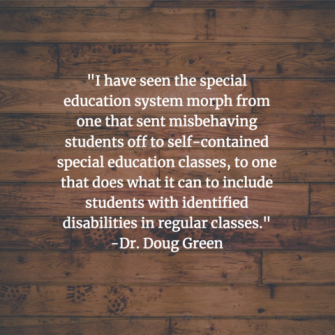
Guest post by Douglas W. Green, EdD
Twitter: @DrDougGreen
Blog: https://DrDougGreen.Com
A recent New York Times article by Erica Green and Katie Benner states that there is an effort to “delay an Obama-era rule to prevent disproportionate numbers of minority children from becoming funneled into special education classes.”
The tone of this and other articles on the topic would make you think that special education is a bad thing, perhaps a form of punishment and racism.
As an educator who started his career in 1969, I have seen the special education system morph from one that sent misbehaving students off to self-contained special education classes, to one that does what it can to include students with identified disabilities in regular classes. As a principal from 1993 to 2006 at a school where 20 percent of the students were classified, I was at the center of the fight between teachers who wanted difficult students packed off to special education rooms and teachers who wanted to support them in regular classes.
The term for this is “inclusion,” and I supported the teachers who wanted to break up most of the special ed. classes. As a result, I was attacked by the teachers who just wanted difficult students out of their classes. They called the superintendent and board of education members with complaints that were minor or made up. I stuck to my guns and somehow persauded five of the seven board members to grant me tenure. This was one situation where tenure had a positive result.
Was There Ever Racist Special Ed. Placements?
I do believe that there was a time when black students, mostly boys, were unfairly sent from the regular classes, but if it still happens, I don’t think it happens to the extent that it did. It certainly does not happen in the schools I have visited since I retired from my principal’s job in 2006. I visit a lot of schools and do independent observations. Everywhere I go, I find students with all but the most severe disabilities spending at least part of the day in regular classes.
As principal, I can say we often got pushback from black parents when we suggested that their children could use support from special education teachers. They believed that my school was like some they heard of where blacks were targeted for removal from the regular classroom. I worked hard to show them what our version of special ed. looked like.
At the time, I even had a self-contained 12:1 (12 students to one teacher) class taught by a black teacher with zero black students. In an effort to convince one black father that our special ed. program was far from racist, I took him to visit this class. I told him that this was not the kind of class we were considering for his son and that his son would only get extra help in the class that he was currently in. I said nothing about the racial makeup of the class we visited. He still refused to cooperate. His son was never classified, but we helped him as much as we could, and I’m proud to say that he graduated on time.
Who Tends to Need Special Education Support?
Let’s consider which type of students are candidates for special education support. Clearly, they are the students who arrive in school with a language deficit. As research shows, these are more likely to be students from poor homes. It’s also well known that black students are more likely to come from poor homes (blacks 21.2%, Hispanics 18,3%, Asians 10%, Whites 8.7%, according to the articles). One should expect, therefore, that black students are more likely to need extra help in school. If that is the case, why shouldn’t they get it?
If you take a look at what they do in Finland, where race is less likely to be an issue, you find a system that is much more efficient. Once a student starts to struggle, he or she instantly gets special education support. By the time a cohort graduates, about half the students get some special education help. In the United States, we spend an inordinate amount of time with meetings to determine who gets help. As a result, kids who just fail to qualify may not get additional attention.
While my school still jumped through the legal hoops, I made sure that special education teachers helped students who weren’t classified because they either just missed the cut or their parents resisted classification. We could have done more if we didn’t have to have so many meetings. I see this happening in other schools I visit.
What Should the Government Do?
It’s time for the government to stop telling us who needs help and who doesn’t. I believe we need to trust our teachers and get out of their way. I wouldn’t want to be a principal in a school where I was pressured to make sure that the special education population mirrored the school population in general in terms of race, and any principal who denies additional support to black students for the sake of some misguided political goal should look for another job.
Cited Sources
Green, Erica L. and Benner, Katie. Trump’s Parkland Inquiry Shifts to Attack on an Obama Legacy, December 18.2018, The New York Times, available online at https://nyti.ms/2Rfko2W.
Federal Safety Net. U.S. Poverty Statistics released September 2018, available online at http://bit.ly/2GCJHb2.
*Photo created using Pablo.com